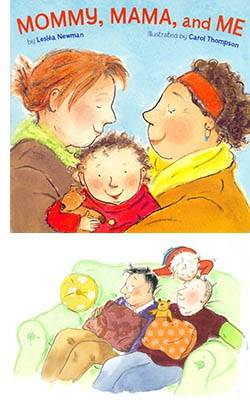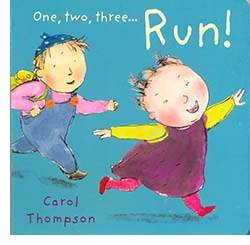What’s the issue with Issue Books?
Published on: 20 January 2015 Author: Carol Thompson
Carol Thompson talks about the importance of 'issue' books for inclusivity.

I love board books – so thanks so much Book Trust for this chance to talk about them! Those often overlooked in Bookshops books – tucked into a far corner, down on the floor, while I crawl on all fours to find them books. Babies, even the very tiniest ones need books, want books, love books.
Touching, smelling, tasting – looking and listening or seeing someone else just like them – and the people around them. They delight in 'kissing' the face 'smelling' the flower or lifting a flap, and often this is a child's first contact with a form of visual art.
The discovery for a child seeing someone 'just like them' and the world around them, reflected in a picture book is an important one. Philip Ardagh – author and BookTrust's Writer in Residence made an important point within his inaugural BookTrust Blog:
'I'll also be looking at diversity - or lack of it - in children's books. Not so much cultural diversity as the diversity of characters with physical disabilities. Shouldn't we all be able to find books peopled with people like us or the people around us?'
Some years ago, while spending an afternoon of 'show and tell' with a writer friend, I showed a work-in-progress that I was really excited about – two small board books about a toddler in a loving family with same-sex parents. 'Oh, I never do 'issue' books, they just don't make money – and publishers just aren't interested' she remarked.
I drove home mulling over her words – she'd really hit a nerve. I'd never heard the term 'issue' book used to describe a picture book in what seemed a negative way – was that what I was doing here? To my mind they were just delightful and reflected something of my own family life and that of the writer's. Surely there were shedloads of families out there in the world - just like ours?!
 This was a time when I began to 'get' the idea of inclusivity and diversity in picture books. In 2009 Tricycle Press published the two small board books, Mommy Mama and me and Daddy Papa and me. They won the Stonewall Honours Prize in the USA. I was lucky to have been chosen as an illustrator for a small publisher that worked hard not to stereotype by gender, appearance or social roles and had already guessed that these little ground-breaking books weren't going to sell in large quantities but were completely committed to them. However, the positive feedback from the readers and through social media has been life-changing and heart-warming. There were heaps of families out there who were just waiting for these books!
This was a time when I began to 'get' the idea of inclusivity and diversity in picture books. In 2009 Tricycle Press published the two small board books, Mommy Mama and me and Daddy Papa and me. They won the Stonewall Honours Prize in the USA. I was lucky to have been chosen as an illustrator for a small publisher that worked hard not to stereotype by gender, appearance or social roles and had already guessed that these little ground-breaking books weren't going to sell in large quantities but were completely committed to them. However, the positive feedback from the readers and through social media has been life-changing and heart-warming. There were heaps of families out there who were just waiting for these books!
I've enormous respect for all the publishers I've worked for, but I've become aware of how books are shaped by the publishing industry, from the culture of each publisher, the tastes of ever-changing editors, to the assumptions made by the sales teams. I think that my friend was mostly correct on one point - most mainstream publishers aren't interested in 'issue' books as they don't make enough money...
However, I've found publishers that are interested and committed to inclusivity and diversity, such as Alanna Books, Frances Lincoln, Barefoot Books - mostly small publishers, with small budgets. Of course they still have to make a profit, but their independence offers a great advantage: they can make quick decisions, they can be bold in trying things out and taking risks.
More recently, working with Child's Play, who have long been dedicated to representing inclusivity and diversity in the early years, has raised my awareness and made me realise how little I know. It has been a steep learning curve. As an illustrator it can be challenging and a struggle to represent differences in a natural and subtle way. They've gently pointed me in the direction of Scope's 'In The Picture' campaign, where myself and other illustrators can pore over resources that help us to include characters with all kinds of disabilities, find book recommendations and connect with experts who can answer our questions. Most importantly, the children have a voice as to how they don't want to see themselves and tell us what they do like.
Campaigns such as 'Inclusive Minds', 'Inside-Outside', 'Without Exception' and the work done by bookseller 'Letterbox Library' are hugely important in raising awareness of inclusion and diversity. Everyone should take a look and show their support!
The Child's Play team have recently supported me in developing a small board book featuring a child with Down syndrome, One, Two, Three... Run! A librarian from New York City Library recently sent me an email:
'Just writing to say this has filled a HUGE gap for me.'

She'd been unable to fulfil requests for a picture book for the very young on this subject. The books are wanted – needed – and they're for everyone. When a small child sees themselves 'in the picture' and can say 'that's me!' That's all the encouragement I need.
Looking back at my early baby board book titles – it would be true to say that my approach was pretty naïve but one of enthusiasm, humour and an eye for the untidy side of life! Publishing has moved forward in its thinking, but there are still challenges as our world grows increasingly diverse. I've great faith in the power of books to make a difference – they can happily include 'issues' - they're about all of us, our life experience and the people around us. We are diverse.
We should give children the best from the very beginning and it should be found on the board book shelf.
Thanks Book Trust!






Add a comment